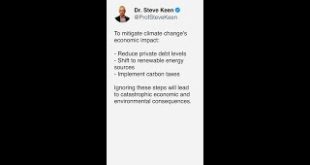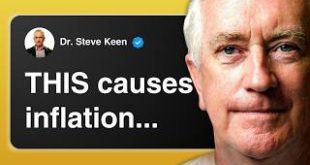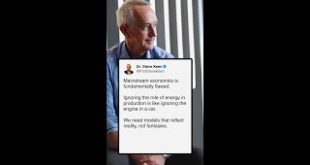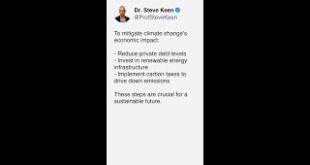Climate change is often viewed as a distant threat. Many believe that economic growth will simply continue, unscathed. This is a dangerous misconception. Ignoring the reality of climate change is like ignoring a storm brewing on the horizon. It’s easy to think it won’t affect you until it’s too late. To mitigate climate change's economic impact, we need to act decisively. First, reducing private debt levels is crucial. High debt levels limit investment in...
Read More »Why the Fed Fails at Inflation
"The tools that the Federal Reserve are using are fundamentally directed at reducing inflation—wage inflation, not markups. They don't really understand it because they've never read Kaleski. They're neoclassical economists. They think ... Milton Friedman is right, and fortunately, Milton Friedman was wrong." --- Join ~10,000 Other Truth-Seekers by Downloading my new 'Funny Money' Bundle for Free at https://new.stevekeenfree.com Are you an engineer, finance, or IT...
Read More »Future Economic Collapse Ahead?
Future Economic Collapse Ahead?
Read More »Energy Ignored: A Fatal Flaw.
Mainstream economics is fundamentally flawed. It's like trying to drive a car without knowing how an engine works. Ignoring the role of energy in production is a critical oversight. Imagine a chef who believes cooking is just about mixing ingredients. What happens when they forget to turn on the stove? The meal remains raw, unappetizing, and ultimately inedible. This is what mainstream economics does when it disregards energy. It creates models that are disconnected from...
Read More »Wealth Effect is a Myth!
Wealth Effect is a Myth!
Read More »Debt Reduction for a Sustainable Future.
To mitigate climate change's economic impact, we need to rethink our approach. First, let's talk about private debt. Imagine trying to swim with a heavy backpack. That’s what private debt does to our economy. It weighs us down. Reducing private debt levels frees up resources. People can invest in their future. They can spend on sustainable options. Next, consider renewable energy infrastructure. Think of it as planting a garden. You nurture it, and it grows....
Read More »Next Crisis: GDP Growth Near Zero?
Next Crisis: GDP Growth Near Zero?
Read More »Bridging the Inequality Divide.
To reduce economic inequality, we often hear the mantra of "trickle-down economics." This idea suggests that if we let the wealthy keep more of their money, they will invest it, creating jobs for everyone else. But this belief is fundamentally flawed. Studies show that wealth concentration leads to economic stagnation. When the rich hoard their wealth, it doesn't magically trickle down. Instead, it creates a desert of opportunity for the rest. The real solution lies in...
Read More »Reinventing Economics with System Dynamics.
Reinventing Economics with System Dynamics.
Read More »Global Warming: Economic Devastation Ahead
Global warming will devastate economies. This isn’t just a catchy phrase. It’s a reality that’s being ignored. Many believe that economies are resilient. They think they can bounce back from anything. This is a comforting myth. The truth is, ignoring climate impacts is like ignoring a ticking time bomb. When it finally goes off, the damage will be catastrophic. Assuming no damage to capital, labor, or technology is absurd. It’s like saying a ship can...
Read More » Steve Keen’s Debt Watch
Steve Keen’s Debt Watch










